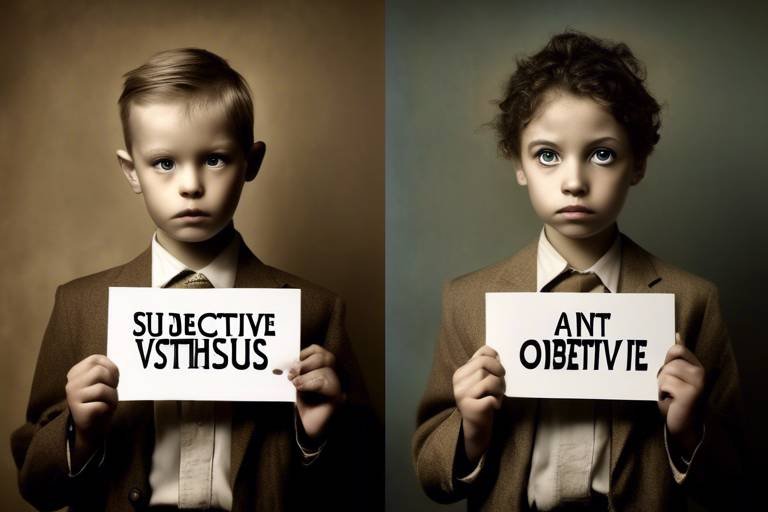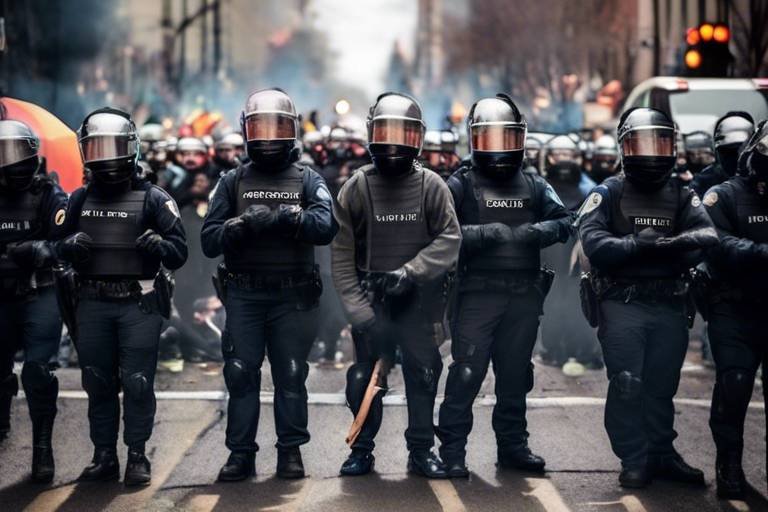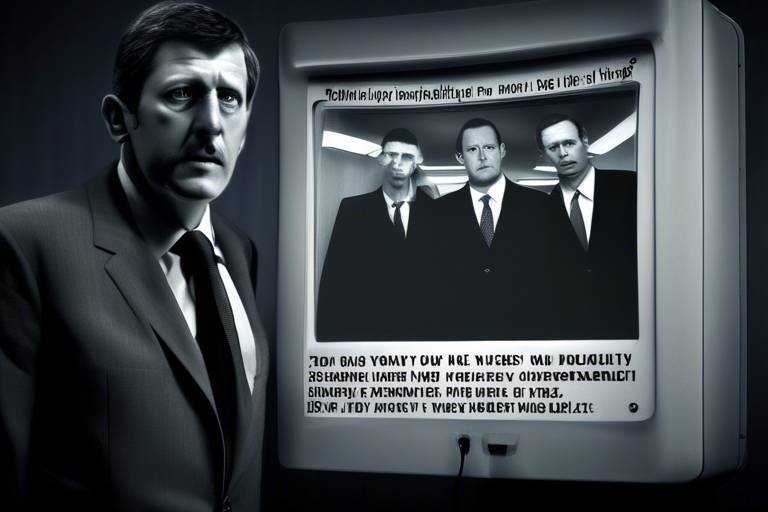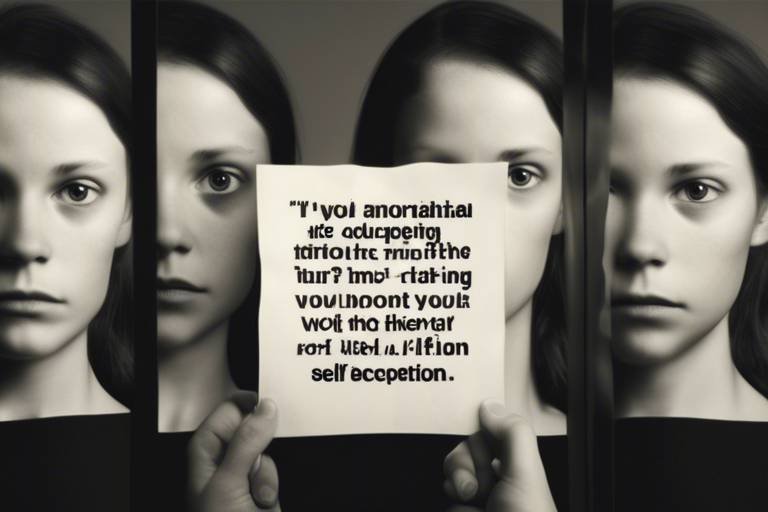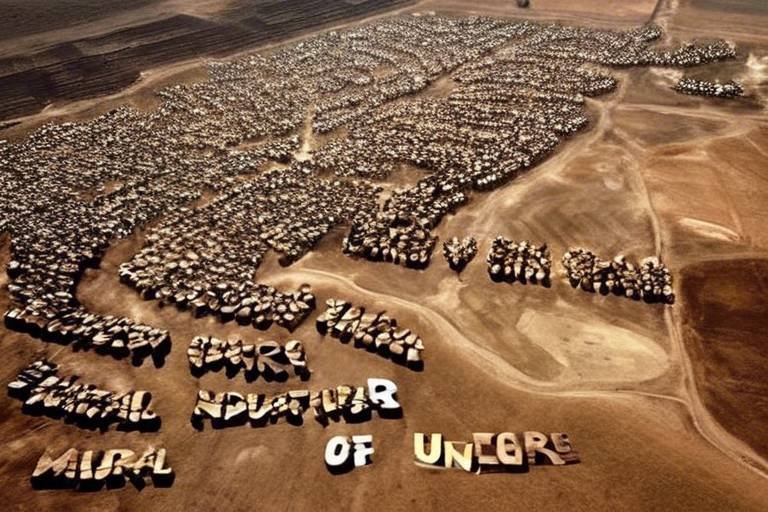Are Stereotypes Ever Ethically Acceptable?
The question of whether stereotypes can ever be ethically acceptable is a complex one, steeped in layers of social, cultural, and psychological factors. To put it simply, stereotypes are like a double-edged sword; they can sometimes serve a purpose in simplifying our understanding of the world, but they also carry the potential for significant harm. Imagine walking into a crowded room filled with strangers. You might instinctively categorize people based on their appearance or behavior—it's a natural human tendency. But does that make it right? Can we justify the use of stereotypes when they often lead to misconceptions and discrimination?
At their core, stereotypes are oversimplified and generalized beliefs about a group of people. They often arise from cultural narratives, historical contexts, and social dynamics, and while they might provide a quick reference point, they frequently overlook the rich diversity within any group. This simplification can lead to a distorted view of reality, where individuals are judged not by their unique traits but by preconceived notions. So, the ethical dilemma emerges: can we ever justify the use of stereotypes for the sake of convenience, or do we have a moral obligation to challenge and dismantle these oversimplified views?
To further understand the ethical implications of stereotypes, we must consider their impact on society and individual identity. Stereotypes can shape our perceptions, influence our decisions, and even dictate our interactions with others. They can lead to systemic inequalities and perpetuate cycles of discrimination. For instance, racial stereotypes have historically marginalized communities, creating barriers that hinder progress and equality. Similarly, gender stereotypes can restrict personal and professional growth, limiting opportunities based on outdated societal norms.
Yet, some argue that stereotypes can be harmless or even beneficial in certain contexts. For instance, in marketing or entertainment, stereotypes might be employed to quickly convey a message or create a relatable character. But at what cost? The challenge lies in balancing the potential utility of stereotypes against their propensity to cause harm. This is where ethical considerations become paramount.
In conclusion, while stereotypes may occasionally provide a shortcut in understanding complex social dynamics, the ethical ramifications of their use cannot be ignored. The conversation surrounding stereotypes is not merely academic; it has real-world implications that affect people's lives. As we navigate this intricate landscape, it becomes essential to question our assumptions and strive for a deeper understanding of the individuals behind the labels. Are we willing to sacrifice the richness of human experience for the sake of convenience? The answer to that question may very well define our ethical stance on stereotypes.
- What are stereotypes? Stereotypes are oversimplified ideas or beliefs about a group of people that often lead to generalizations.
- Why are stereotypes considered harmful? They can perpetuate discrimination, limit opportunities, and create misunderstandings about individuals and groups.
- Can stereotypes ever be useful? In certain contexts, like marketing or storytelling, they may simplify communication, but their potential for harm often outweighs their benefits.
- How can we combat stereotypes? Education, open dialogue, and exposure to diverse perspectives are crucial in challenging and dismantling stereotypes.

Understanding Stereotypes
Stereotypes are oversimplified ideas about groups of people, often based on characteristics such as race, gender, age, or profession. They can be seen as mental shortcuts that help us navigate the complexities of social interactions. However, while these mental shortcuts can sometimes seem convenient, they often lead to a distorted understanding of individuals and their unique traits. Imagine trying to fit a square peg into a round hole; that’s exactly what happens when we apply stereotypes to people. Instead of recognizing their individuality, we force them into predefined boxes that don’t accurately represent who they are.
The origins of stereotypes are as varied as the groups they aim to categorize. Historically, stereotypes have been shaped by cultural narratives, media portrayals, and social experiences. For instance, in many cultures, media representation plays a significant role in cementing certain stereotypes. A character in a film might embody a stereotype that reinforces a biased view of a particular group, leading audiences to unconsciously accept these portrayals as truth. This is particularly evident in the way certain professions are depicted; think about how often you see a police officer portrayed as a tough, no-nonsense individual or a nurse as a caring, nurturing woman. Such representations can shape societal expectations and influence how individuals perceive their roles within their communities.
Moreover, stereotypes are not static; they evolve over time. As society progresses, some stereotypes may diminish, while new ones emerge. For instance, the advent of social media has given rise to new stereotypes about millennials and Gen Z, often portraying them as tech-savvy but socially inept. These evolving stereotypes can have profound effects on how individuals identify themselves and how they are perceived by others. It's essential to recognize that stereotypes can lead to both positive and negative outcomes. While some might argue that certain stereotypes can foster a sense of belonging within a group, they often do so at the expense of misrepresenting others.
Understanding stereotypes requires a critical examination of their characteristics. Here are a few key aspects to consider:
- Generalization: Stereotypes often rely on broad generalizations that ignore individual differences.
- Resistance to Change: Once formed, stereotypes can be incredibly resistant to change, even in the face of contradictory evidence.
- Emotional Response: Stereotypes can evoke strong emotional reactions, both positive and negative, influencing how we interact with others.
In summary, while stereotypes might provide a convenient way to categorize people, they often do more harm than good. They can lead to misunderstandings, reinforce prejudices, and contribute to systemic inequalities. Recognizing the complexities behind stereotypes is the first step towards challenging and dismantling them. By fostering open conversations and promoting understanding, we can work towards a society where individuals are seen for who they truly are, rather than merely as representatives of a stereotype.

Types of Stereotypes
Stereotypes come in many shapes and sizes, each with its own flavor of bias and generalization. Understanding the different types of stereotypes is essential because they shape our perceptions and interactions in profound ways. Broadly speaking, stereotypes can be categorized into several groups, including racial, gender, and cultural stereotypes. Each type not only reflects societal attitudes but also has unique implications that can either uplift or harm individuals and communities.
Racial stereotypes, for instance, are often deeply rooted in historical contexts and societal narratives. They can lead to unfair assumptions about individuals based solely on their ethnicity or skin color. For example, the stereotype that all African Americans are good at sports or that Asians are inherently good at math oversimplifies and distorts the rich diversity of individual talents and experiences within these groups.
Gender stereotypes, on the other hand, dictate what is considered appropriate behavior based on one's sex. These stereotypes can limit personal growth and professional opportunities. For instance, the belief that women are nurturing and should prioritize family over career can hinder their advancement in the workplace. Conversely, the stereotype that men should be stoic and aggressive can prevent them from expressing vulnerability or pursuing careers in caregiving.
Cultural stereotypes also play a significant role in shaping perceptions. They often arise from misunderstandings or lack of exposure to different cultures. For example, the stereotype that all Italians are passionate and loud can lead to oversimplified views that ignore the diversity within Italian culture itself. Such stereotypes can foster division and misunderstanding among different cultural groups.
To illustrate the various types of stereotypes, consider the following table:
| Type of Stereotype | Description | Implications |
|---|---|---|
| Racial | Generalizations based on race or ethnicity. | Can lead to discrimination and social injustice. |
| Gender | Assumptions about behaviors and roles based on sex. | Can restrict personal and professional growth. |
| Cultural | Simplistic views of different cultures. | Can foster misunderstanding and division. |
In conclusion, recognizing the types of stereotypes is crucial for fostering a more inclusive and understanding society. By understanding how these stereotypes operate, we can begin to challenge and dismantle the harmful narratives that persist in our culture. It’s essential to engage in conversations that promote awareness and empathy, allowing us to see individuals beyond their stereotypes.
- What are stereotypes? Stereotypes are oversimplified ideas or generalized beliefs about a particular group of people, often leading to misconceptions.
- Why are stereotypes harmful? They can perpetuate discrimination, reinforce social inequalities, and limit individuals' potential by placing them in predefined boxes.
- How can we challenge stereotypes? By educating ourselves and others, engaging in open discussions, and promoting diverse representations in media and society.

Racial Stereotypes
Racial stereotypes are oversimplified and often exaggerated beliefs about individuals based on their race. These stereotypes can manifest in various forms, from the seemingly harmless to the overtly harmful. They often arise from a combination of historical context, cultural narratives, and social interactions that shape how we perceive others. For instance, one might hear phrases like "all [insert race] are good at sports" or "people of [insert race] are lazy." Such sweeping generalizations not only misrepresent individuals but also contribute to the perpetuation of social injustices.
The origins of racial stereotypes can be traced back to colonialism and the historical need to justify the subjugation of certain groups. For example, during the era of colonial expansion, European powers often depicted colonized peoples as "savage" or "primitive" to rationalize their dominance. This not only dehumanized entire cultures but also laid the groundwork for persistent stereotypes that continue to influence public perception today. The implications of these stereotypes are profound, as they affect everything from individual self-esteem to systemic policies that govern education, employment, and law enforcement.
The impact of racial stereotypes extends beyond individual experiences; it seeps into the very fabric of society. When society collectively holds onto these stereotypes, they can lead to systemic inequality. For example, racial profiling is a direct consequence of these oversimplified beliefs, where individuals are judged not by their actions but by the color of their skin. This not only fosters an environment of fear and mistrust but also creates barriers to opportunities and resources for marginalized communities.
To illustrate the impact of racial stereotypes, consider the following table that highlights some common stereotypes and their potential consequences:
| Stereotype | Common Consequences |
|---|---|
| All [insert race] are criminals | Increased racial profiling and discrimination in law enforcement |
| People of [insert race] are less intelligent | Lower expectations in educational settings, resulting in fewer opportunities |
| All [insert race] are good at sports | Pressure to conform to athletic stereotypes, neglecting other talents |
Combating these stereotypes is crucial for fostering a more equitable society. Many movements and organizations are dedicated to raising awareness about the damaging effects of racial stereotypes and advocating for change. From educational initiatives aimed at promoting cultural understanding to community programs that celebrate diversity, there are numerous ways individuals can contribute to dismantling these harmful beliefs.
In conclusion, racial stereotypes are not just trivial misconceptions; they are deeply rooted beliefs that can have serious implications for individuals and society as a whole. By understanding their origins and impacts, we can begin to challenge and change the narratives that shape our perceptions of one another. It's essential to recognize that each person is an individual, deserving of respect and understanding, rather than being reduced to a stereotype.

Impact on Society
The impact of racial stereotypes on society is profound and far-reaching. These oversimplified beliefs about individuals based on their race can lead to significant social injustices and systemic inequality. When society accepts these stereotypes as truth, it creates a ripple effect that influences everything from personal interactions to institutional policies. For instance, consider how racial stereotypes can shape the way people perceive and interact with one another. If someone believes that a particular race is inherently more aggressive, they may approach individuals from that race with suspicion or hostility, perpetuating a cycle of fear and misunderstanding.
Moreover, the consequences of these stereotypes extend beyond individual interactions; they infiltrate social structures and institutions. For example, in the workplace, racial stereotypes can affect hiring decisions, promotions, and workplace dynamics. Studies have shown that candidates from marginalized racial backgrounds often face biases that can limit their opportunities for advancement, which in turn reinforces societal inequalities. This creates a vicious cycle where stereotypes lead to discrimination, and discrimination further entrenches these stereotypes.
To illustrate the societal impact of racial stereotypes, consider the following table that outlines some key areas affected:
| Area | Impact of Racial Stereotypes |
|---|---|
| Education | Students from marginalized backgrounds may face lower expectations and fewer resources, affecting their academic performance. |
| Criminal Justice | Racial profiling can lead to disproportionate policing and incarceration rates among specific racial groups. |
| Healthcare | Racial stereotypes can result in biased treatment and disparities in healthcare access and outcomes. |
| Media Representation | Media often reinforces negative stereotypes, shaping public perception and attitudes towards certain racial groups. |
In conclusion, the societal impact of racial stereotypes is not just a matter of individual prejudice; it is a systemic issue that affects various facets of life. Addressing these stereotypes requires collective action and a commitment to understanding the complexities of race and identity. By challenging these harmful beliefs and advocating for change, society can begin to dismantle the barriers that perpetuate inequality and foster a more inclusive environment for all.
- What are stereotypes? Stereotypes are oversimplified ideas or generalized beliefs about a particular group of people.
- How do racial stereotypes affect society? Racial stereotypes can lead to discrimination, social injustice, and systemic inequality across various sectors, including education, healthcare, and criminal justice.
- Can stereotypes ever be justified? The ethical implications of stereotypes are complex, and while some argue they can serve practical purposes, the harm they cause often outweighs any perceived benefits.
- What can be done to combat racial stereotypes? Education, awareness campaigns, and advocacy for policy changes are crucial steps in reducing the prevalence of racial stereotypes.

Counteracting Racial Stereotypes
Counteracting racial stereotypes is not just a noble endeavor; it's a necessary one for fostering an inclusive society. These stereotypes, often rooted in ignorance and perpetuated by media representations, can have devastating effects on individuals and communities. So, how do we tackle this pervasive issue? It starts with education. By educating ourselves and others about the complexities of different cultures and identities, we can challenge the oversimplified narratives that fuel stereotypes.
One effective method is through storytelling. Sharing personal stories allows individuals to connect on a human level, breaking down the barriers that stereotypes create. When we hear about someone’s lived experience, it becomes harder to pigeonhole them into a stereotype. Furthermore, initiatives that amplify diverse voices in media and literature can shift perceptions and challenge the status quo.
Another critical approach is community engagement. When communities come together, they create a tapestry of experiences and perspectives that enrich our understanding of one another. Programs that promote intercultural dialogue can help dispel myths and foster empathy. For instance, community forums or workshops that encourage discussion about race and identity can provide a platform for individuals to express their thoughts and feelings, ultimately leading to greater understanding and respect.
Organizations and schools also play a vital role in countering racial stereotypes. Implementing diversity training and inclusive curricula can help dismantle preconceived notions from an early age. By teaching children about the value of diversity and the dangers of stereotypes, we can cultivate a generation that values differences rather than fears them. It's essential to create environments where all individuals feel valued and respected, regardless of their background.
Moreover, social media can be a double-edged sword. While it can perpetuate stereotypes, it also has the power to challenge them. Campaigns that promote positive representations of marginalized communities can help reshape narratives. For example, hashtags that celebrate diversity or highlight stories of resilience can spread awareness and encourage others to join the fight against stereotypes.
Ultimately, countering racial stereotypes requires a collective effort. It's about challenging our own biases and being willing to engage in uncomfortable conversations. By holding ourselves accountable and supporting initiatives that promote inclusion, we can contribute to a more equitable society. Remember, every small action counts, whether it’s speaking up against a stereotype, educating a friend, or sharing diverse stories. Together, we can create a world where individuals are seen for who they are, rather than the stereotypes that society imposes on them.
- What are racial stereotypes? Racial stereotypes are oversimplified and generalized beliefs about a particular race or ethnic group, often lacking nuance and accuracy.
- How do stereotypes affect individuals? Stereotypes can lead to discrimination, limit opportunities, and negatively impact mental health and self-esteem.
- What can I do to help combat stereotypes? Educate yourself and others, engage in conversations about race, support diverse voices in media, and challenge stereotypes when you encounter them.
- Are all stereotypes harmful? While some stereotypes may seem harmless, they often contribute to broader systemic issues and can perpetuate discrimination and inequality.

Gender Stereotypes
Gender stereotypes are pervasive beliefs that dictate how individuals should behave based on their gender. These stereotypes can often be so deeply ingrained in society that they shape our perceptions from an early age. For instance, the idea that men should be strong and unemotional while women should be nurturing and sensitive is a classic example. Such expectations can limit personal expression and lead to significant societal consequences.
In professional settings, gender stereotypes can have particularly damaging effects. Women may face skepticism regarding their capabilities in leadership roles, often being labeled as too emotional or not assertive enough. Conversely, men may feel pressured to suppress their emotions, adhering to an outdated notion of masculinity that discourages vulnerability. This creates a cycle where individuals feel compelled to conform to these stereotypes, resulting in a lack of authenticity and personal fulfillment.
Moreover, gender stereotypes extend beyond individual experiences and infiltrate various aspects of culture, including media representation and educational materials. For example, children’s toys are often marketed with specific gender roles in mind, which can influence their interests and aspirations. A report by the American Psychological Association highlights that children exposed to traditional gender roles are less likely to pursue careers in fields that are considered non-traditional for their gender, such as engineering for girls or nursing for boys.
To illustrate the impact of gender stereotypes, consider the following table that outlines common stereotypes and their implications:
| Stereotype | Implication |
|---|---|
| Men should be the primary breadwinners | Pressure on men to prioritize work over family |
| Women are better caregivers | Undermines women's professional ambitions |
| Men should not show emotion | Leads to mental health issues due to emotional repression |
| Women are too emotional for leadership | Limits women's opportunities for advancement |
As society continues to evolve, it is crucial to challenge and dismantle these stereotypes. Efforts to promote gender equality and encourage individuals to pursue their passions, regardless of societal expectations, are vital. Education plays a significant role in this process. By teaching children about gender diversity and the importance of breaking free from traditional roles, we can cultivate a more inclusive environment.
In conclusion, gender stereotypes not only restrict individual potential but also hinder societal progress. By recognizing and addressing these stereotypes, we can foster a culture that values diversity and encourages everyone to contribute their unique talents, regardless of gender. The journey towards equality is ongoing, but with awareness and action, we can create a world where everyone has the freedom to be themselves.
- What are gender stereotypes? Gender stereotypes are oversimplified and widely held beliefs about the characteristics and roles that are appropriate for men and women.
- How do gender stereotypes affect society? They can create barriers to equality, limit personal expression, and perpetuate discrimination in various settings, including the workplace.
- Can gender stereotypes be changed? Yes, through education, awareness, and challenging traditional norms, we can work towards changing harmful stereotypes.
- Why are gender stereotypes harmful? They restrict individual potential, contribute to mental health issues, and perpetuate inequality and discrimination.

Ethical Considerations
The ethics surrounding stereotypes is a complex and often contentious topic. At its core, the debate revolves around the harm that stereotypes can inflict versus the intent behind their use. Many argue that stereotypes, while oversimplified, can sometimes serve a purpose in society. For instance, they might provide a quick reference point in social interactions or help in making sense of cultural differences. But at what cost? The potential for harm is significant, as stereotypes can lead to misunderstandings, discrimination, and even violence against marginalized groups.
When we delve deeper into the ethical implications, two primary frameworks often arise: utilitarianism and deontological ethics. Utilitarian perspectives focus on the outcomes of actions, weighing the benefits against the harms. Proponents might argue that if a stereotype brings about some benefit, such as fostering community bonding through shared experiences, it could be seen as acceptable. However, this viewpoint raises critical questions: Are the benefits substantial enough to justify the potential harm? Can we ever truly quantify the damage done to an individual's identity or dignity?
On the flip side, deontological ethics emphasizes the morality of actions themselves, irrespective of the outcomes. From this perspective, stereotypes are inherently wrong because they reduce individuals to mere caricatures, stripping away their unique identities and humanity. This viewpoint argues that perpetuating stereotypes is a violation of fundamental moral principles, regardless of any perceived benefits. If we consider the impact of stereotypes on a societal level, we can see how they contribute to systemic inequalities and reinforce existing power dynamics.
Moreover, the ethical implications of stereotypes can vary significantly across different contexts. For example, in a professional setting, relying on gender stereotypes can lead to discriminatory hiring practices, creating a hostile work environment. In cultural contexts, racial stereotypes can perpetuate harmful narratives that dehumanize entire communities. The consequences of these stereotypes can be far-reaching, affecting not just individual lives but also societal structures at large.
As we navigate these ethical waters, it's crucial to consider the role of intent behind the use of stereotypes. Are they being employed to foster understanding and connection, or are they tools of oppression and division? This distinction is vital as it shapes our response to stereotypes in various contexts. Ultimately, the question remains: can we ever find a justification for stereotypes that outweighs the ethical concerns they raise?
- What are stereotypes? Stereotypes are oversimplified ideas or beliefs about a particular group of people, often based on characteristics such as race, gender, or culture.
- Why are stereotypes harmful? Stereotypes can lead to discrimination, reinforce social inequalities, and negatively impact individual identity and self-esteem.
- Can stereotypes ever be justified? The ethical debate surrounding stereotypes is complex; while some argue they can have social benefits, many believe the harm they cause far outweighs any potential justification.

Utilitarian Perspectives
When we dive into the realm of , we find ourselves grappling with a fundamental question: can the use of stereotypes ever produce more good than harm? Utilitarianism, a moral philosophy that advocates for actions that maximize overall happiness or utility, provides a framework for analyzing the implications of stereotypes. At first glance, it might seem that stereotypes could serve a purpose, perhaps by simplifying complex social interactions or helping individuals make quick judgments. However, the reality is far more nuanced.
To understand this, let’s consider a few key points:
- Efficiency vs. Accuracy: Stereotypes can create a sense of efficiency in communication, allowing people to categorize others quickly. However, this efficiency often comes at the cost of accuracy, leading to misunderstandings and reinforcing false narratives.
- Short-term Gain vs. Long-term Consequences: While stereotypes may provide immediate social benefits, such as bonding over shared beliefs, they can lead to long-term societal harm. For instance, relying on racial stereotypes might foster a sense of unity among certain groups but simultaneously perpetuate division and discrimination.
- Collective Happiness vs. Individual Harm: Utilitarianism emphasizes the greatest good for the greatest number. However, this principle can be problematic when the happiness of the majority comes at the expense of marginalized individuals. The question arises: is it ethical to sacrifice the well-being of a few for the happiness of many?
Moreover, the consequences of stereotypes often extend beyond individual interactions. They can shape societal norms and institutional policies, leading to systemic inequalities. For example, in the workplace, gender stereotypes might create an environment where women are overlooked for leadership roles, ultimately affecting not just individual careers but the overall productivity and morale of the organization.
In essence, while utilitarian perspectives might suggest that stereotypes could have some utility, the overwhelming evidence points to the fact that their negative impacts often outweigh any perceived benefits. As we reflect on this, we must ask ourselves: can we truly justify the use of stereotypes when their consequences can be so damaging? The challenge lies in finding a balance between simplifying human interactions and recognizing the complex, rich tapestry of individual identities.
In conclusion, from a utilitarian standpoint, the ethical implications of stereotypes are deeply troubling. While they may offer short-term conveniences, the long-term repercussions on society and individuals are far too significant to ignore. As we strive for a more equitable world, it becomes crucial to challenge and dismantle these oversimplified notions that do more harm than good.
- What are stereotypes? Stereotypes are oversimplified and generalized beliefs about a particular group of people, often based on race, gender, or culture.
- Why are stereotypes harmful? They can perpetuate discrimination, reinforce social injustices, and lead to systemic inequalities.
- Can stereotypes ever be useful? While they may provide quick judgments in some social situations, the risks of misunderstanding and harm often outweigh any benefits.
- What can be done to combat stereotypes? Education, awareness, and promoting diversity are essential steps in challenging and reducing the prevalence of stereotypes in society.

Deontological Perspectives
When we dive into the realm of deontological ethics, we encounter a framework that places a premium on the morality of actions themselves, rather than their consequences. In simple terms, deontologists argue that certain actions are inherently right or wrong, regardless of the outcomes they produce. This perspective challenges the notion that stereotypes can ever be ethically acceptable, as it emphasizes the moral implications of labeling individuals based on generalized traits.
To understand this viewpoint better, consider the analogy of a compass. Just as a compass points true north regardless of the terrain, deontological ethics directs us towards moral truths that remain constant, irrespective of the situation. Stereotypes, however, often lead us astray, guiding our perceptions and judgments in a manner that can be fundamentally unfair and damaging.
One of the central tenets of deontological thought is the concept of respect for individuals. By reducing people to mere stereotypes, we strip them of their unique identities and experiences. This reductionist view not only disrespects the individual but also perpetuates a cycle of misunderstanding and prejudice. For instance, when someone is labeled as "lazy" simply because of their socioeconomic background, it ignores the myriad factors that contribute to their situation, effectively denying their humanity.
Moreover, stereotypes can foster a culture of discrimination and exclusion. When society accepts these oversimplified views, it creates an environment where individuals feel justified in treating others unfairly based on preconceived notions. This not only harms those who are stereotyped but also erodes the moral fabric of society as a whole. In essence, deontological ethics would argue that the act of stereotyping itself is morally wrong, as it violates the principle of treating others as ends in themselves rather than means to an end.
In the context of racial and gender stereotypes, the implications become even more pronounced. Racial stereotypes, for example, have historically been used to justify oppression and inequality. By categorizing individuals based on race, society has often overlooked the rich diversity and complexity within each racial group. This simplification not only perpetuates injustice but also hinders social progress. Similarly, gender stereotypes can confine individuals to rigid roles, limiting their potential and reinforcing harmful societal norms.
Ultimately, the deontological perspective compels us to consider the ethical ramifications of our beliefs and actions. It urges us to reflect on the inherent dignity of every individual and to challenge the stereotypes that undermine that dignity. By recognizing the moral weight of our judgments, we can begin to dismantle the harmful narratives that stereotypes create and foster a more inclusive and equitable society.
- What is deontological ethics? Deontological ethics is a moral philosophy that evaluates the morality of actions based on whether they adhere to rules or duties, rather than their consequences.
- Can stereotypes ever be justified? From a deontological perspective, stereotypes cannot be justified as they inherently violate the respect and dignity owed to individuals.
- How do stereotypes affect society? Stereotypes can lead to discrimination, social injustice, and a lack of understanding among different groups, ultimately harming societal cohesion.
- What can be done to combat stereotypes? Education, awareness campaigns, and fostering open dialogues about diversity and inclusion are effective strategies to combat stereotypes.
Frequently Asked Questions
- What are stereotypes?
Stereotypes are oversimplified and generalized beliefs about a particular group of people. They often stem from cultural, social, or historical contexts and can influence how individuals perceive and interact with each other.
- Are all stereotypes harmful?
While some stereotypes can be benign or even humorous, many are harmful as they perpetuate discrimination and reinforce negative biases. The impact of stereotypes can lead to systemic inequality and social injustice.
- How do racial stereotypes affect society?
Racial stereotypes can create barriers between communities, leading to misunderstandings and conflict. They can also contribute to systemic issues such as unequal treatment in the workplace, education, and law enforcement.
- What can be done to counteract stereotypes?
Counteracting stereotypes requires education, awareness, and open dialogue. Initiatives like diversity training, community engagement, and representation in media can help challenge and change these perceptions.
- Can stereotypes ever be ethically acceptable?
The ethical acceptability of stereotypes is debated. Some argue that if a stereotype is based on a grain of truth, it might be justifiable in certain contexts. However, many believe that the potential harm caused by stereotypes outweighs any perceived benefits.
- What are gender stereotypes?
Gender stereotypes are preconceived notions about how individuals should behave based on their gender. These stereotypes can limit personal expression and lead to discrimination in various areas, including the workplace.
- How do utilitarian perspectives view stereotypes?
From a utilitarian standpoint, the focus is on the outcomes of using stereotypes. If the benefits of a stereotype (like quick decision-making) are perceived to outweigh the harms, some may argue for their use, though this is highly contentious.
- What are deontological perspectives on stereotypes?
Deontological ethics emphasize the morality of actions themselves, suggesting that stereotypes are inherently wrong regardless of their consequences. This view advocates for treating individuals as unique rather than as representatives of a group.





